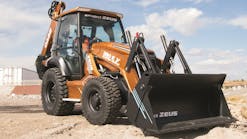The locals of the International Union of Operating Engineers (IUOE) in Washington, DC, have excellent training programs for teaching heavy-equipment operation–either for the novice or the experienced operator. The problem is that it is very difficult to get into an apprenticeship training program if one is a novice and not a member of that union: For every one apprentice a local admits, there are 20 or more eager candidates on the waiting list.But there is no need for the aspiring construction-equipment operator to despair. As we point out in this article, there are numerous other places to get excellent construction-equipment-operator or repair-technician training, namely private operator training schools, construction equipment manufacturers, and that growing mainstay of practical training for industrial needs: America’s community colleges. With appropriate training, one can then approach a construction company with a solid chance of landing a job as a construction equipment operator or a repair technician.IUOE: Training Bastion for New and Experienced OperatorsSome sources say that about half the construction equipment operators in the United States hold membership in one of the locals of the IUOE (www.iuoe.org). In some regions of the country, such as the Midwest, unionization is intense, whereas in other regions, such as the South, there are few unions.Many locals of the IUOE have excellent training programs, both for apprentices and for experienced (i.e., journeymen) construction equipment operators. For instance, in IUOE Local 649 (Peoria, IL, www.iuoe649.org), union members are charged $0.30/hr. out of their total hourly earnings of $36/hr. (this figure includes pension, health care, annuity, and other fringe benefits) for a contribution to the apprentice-training fund and $0.30/hr. for an upgrade fund, the proceeds of which are used to run a continuing training program for journeyman operators.All these wonderful training programs offered by local, regional, and national units of the IUOE are open to IUOE members only. Accordingly, nonunion members will have to search elsewhere to meet their training needs.Without question, an aspiring construction-equipment operator would receive excellent training–free of charge–in an apprenticeship training program of one of the locals of the IUOE. The problem is getting into such a program. According to John Salzer, training director for Local 649, his local of 1,500 members admits only 12-20 new apprentices each year. These lucky chosen ones are selected from a waiting list that has at least 10-20 times that number.Many IUOE locals also have excellent training programs–at no charge–for experienced construction-equipment operators who are union members, to keep them up to date on the latest technology (e.g., global positioning system—controlled construction equipment). Training is usually done in winter months when there is a lull in construction activity. In Local 649, for instance, as Salzer explains, training for experienced operating engineers is usually held for four weeks during the winter, with typically 20 operators per day attending. Union members use this time to earn certification on construction equipment they are not currently trained on.Explains Salzer, “Certification of construction equipment operators is not required by the state. The greatest benefit of going through an operating engineers training program is the training received. An operator learns the latest techniques, is exposed to the latest technology. Certification will bring this worker more work in the future when contractors are seeking workers for a project with particular qualifications.”The IUOE locally and nationally has a wide range of training programs available for members, not only dealing with construction equipment operation but also with such special topics as Occupational Safety & Health Administration training and hazardous-materials training. For example, IUOE Local 324 (Lavonia, MI, www.iuoe324.org), a large local serving much of Michigan, offers a wide range of training courses for both apprentices and journeymen at its 365-ac. site in Howell, MI, including excavating, grading, GPS-controlled construction equipment, hazmat, crane operation, and safety.Virtually all the training needs of both apprentice and journeyman operating engineers, Salzer believes, can be met by IUOE’s local, regional, or national training programs–at no charge to members. Only on rare occasions (e.g., for specialized training, such as for asbestos, for pipeline training, or to get a pilot’s license for operating a dredging barge) would an operator have to go outside the local IUOE union to find an appropriate training program.Where Can Nonunion People Turn for Training?So unless an aspiring construction equipment operator has a stroke of luck, it is unlikely he will be admitted into an IUOE apprenticeship program. Where then can he turn to get the training he needs to become a heavy-equipment operator or a repair technician?There is no need to despair: The IUOE does not have a monopoly on heavy-equipment operator training. The aspiring operator can get his training elsewhere–through certain, select community colleges, private schools, or construction equipment manufacturers or dealerships offering heavy-equipment operator training (similar to the ones quickly sketched in this article).Such operator training programs can vary in length from two and a half days to a year, can train the operator on one or several pieces of construction equipment, and can cost anywhere from $600 on up to $5,000 or more. Many schools can arrange financial aid–even for students who are flat broke–through state, federal, or private programs. Loans can be paid back over several years, once the student has begun working.Armed with a heavy-equipment operator certificate from such an institution, the newly minted heavy-equipment operator has a good chance of landing a job with a construction contractor. He can brighten his employment prospects by being certified to operate not just one piece of construction equipment but several–bulldozers, loaders, loader-backhoes, excavators, graders, and scrapers. An operator also makes himself more attractive to prospective contractor employers by having a Class A commercial driver’s license (CDL), which enables him to operate a dump truck or a tractor-trailer lowboy, used for towing construction equipment to and from construction sites.Caterpillar: Short Courses for Journeymen and NovicesSince 1996, the world’s leading manufacturer of construction equipment, Caterpillar, has offered two-and-a-half- and five-day short courses for both experienced and novice construction equipment operators at facilities in Peoria, IL, and Tinaja Hills, just south of Tucson, AZ.Caterpillar’s subsidiary, Caterpillar Equipment Training (www.cat.com/services/caterpillar_equipment_training/caterpillar_equipment_training.html), launched this training program because it saw a pressing need to improve the effectiveness and safety-consciousness of experienced construction equipment operators. As Tom Brady, training coordinator for Caterpillar Equipment Training in Peoria, observes, construction companies spend a fortune on construction equipment, yet that equipment often is used far below its productive potential; even many experienced operators are unaware of the most effective methods for planning their work and operating their equipment.Actual training results show, Brady maintains, that better trained operators can boost productivity in a well-run construction company, at the very least, by 2%, an improvement that would pay back the training costs manyfold even in the first year. More typically, better trained workers yield productivity increases of 10% or more. Beyond that, better trained operators mean a reduction in maintenance costs and fuel use. As part of their Cat training, for instance, operators are urged to plan work better and to minimize operating dozers in reverse, as doing so is hard on undercarriages. And on wheeled loaders, Cat trainers show operators how to load equipment without spinning tires excessively, a practice that causes excessive tire wear.“At the Caterpillar Equipment Training schools in Illinois and Arizona,” Brady explains, “we teach both experienced and novice operators how to move earth faster and to do it in a way that minimizes wear and tear on the construction equipment and that reduces fuel consumption. We teach them how to think as they work–how to figure out, under the particular job-site conditions, what is the best way to utilize the machine. We focus strictly on Caterpillar equipment operator training–not on maintenance and repair of equipment. We are not training equipment mechanics here. Such is done mainly through a select number of community colleges around the US.”Tuition is $1,500 for a two-and-a-half-day short course and $3,000 for a five-day short course. Admission is open to anyone, experienced or novice. Cat devotes five days to training on the scraper; five days on the motor grader; and two and a half days each on the bulldozer, loader, backhoe-loader, excavator, and off-highway truck. Since 1996, 3,500 students have passed through these Cat training courses. Room and board are the student’s responsibility, as is the financing of tuition. In addition to these courses held at the sites in Illinois and Arizona, Cat offers construction equipment training on the contractor’s site.About 30% of the students that come to Caterpillar Equipment Training, Brady says, are novices with no experience operating construction equipment. Sometimes these students pay their own way, seeing this Cat training program as a very fast way to land a job as a construction equipment operator. Cat trains operators only on its equipment, for that is the equipment the school knows best. All students receive a diploma indicating they have attended the Caterpillar school. If a student earns a grade of 85% or higher, he receives a certificate proclaiming him a Cat-certified operator.Even if a student has had no prior experience as an operator, Brady says, he learns much from the course. And the prestige of the Caterpillar certificate is very helpful in landing a job as a construction equipment operator.Brady believes there is a shortage of construction equipment operators, a consequence of the fact that fewer people are entering the construction industry now than in the past. High schools have not been promoting the construction trades. And many high school grads have been opting for computer specialties and other office-related jobs.Nonetheless, construction equipment operators are paid well, many making between $15 and $35/hr. There has been considerable corporate downsizing going on in the US, with some white-collar workers becoming construction equipment operators.
Private Heavy-Equipment Operator SchoolsThere are at least 18 private heavy-equipment operator schools in the US and Canada (see www.equiptrain.com). In addition to training students to operate construction equipment, some schools also train operators to drive dump trucks and tractor-trailer lowboys. Let’s take a quick look at a few private construction equipment operator schools. Ralph Green, owner of Al-Win Heavy-Equipment Operator’s School in West Jefferson, OH (740/852-1244), says his program stresses hands-on training–as distinct from some other heavy-equipment training schools that stress classroom over field instruction (perhaps because they might lack an adequate fleet of construction equipment to train on). Founded 43 years ago, the Al-Win School, a subsidiary of Green’s excavation company, trains students in operating loaders, backhoes, excavators, and cranes.This hands-on training program lasts three weeks, and tuition is $5,500. Typically there are eight students in a three-week class. And the school graduates about 60 people per year. Prospective students might be able to receive financial assistance through the recently passed federal Workforce Investment Act, which provides up to $8,000 for retraining (check with your state unemployment office). Graduates receive a certificate in heavy-equipment operation.“Many of the boys who come into this program,” Green notes, “are high school grads, but they don’t have to be. A prospective student need only be 18 years old or older and have a clean record–no felonies. Many who come into the program say that they are not much with the books and seek a program that is hands-on. They want to be doing–not reading through books and manuals. We provide them with that hands-on training.”Many entering the Al-Win program, Green says, have long yearned to be heavy-equipment operators. Most are high school grads, and many are between 18 and 21 years old. Sometimes students are older or, in a few cases, women. One graduate, for instance, was a recently widowed 59-year-old woman. For years before entering Al-Win, she had had a Class A CDL and had driven a tractor-trailer with her husband. After her husband died, she pursued her lifelong ambition of becoming a heavy-equipment operator.Upon graduation, this woman landed a job with a major contractor near Columbus, OH, starting at $24/hr. One thing that made her especially valuable to her new employer–and gave her a competitive advantage in the job market–was that she held a Class A CDL (only 30% of construction equipment operators, Green estimates, hold one). She was able to drive tractor-trailer lowboys to haul construction equipment to and from construction sites.In sum, Green believes there is a brisk demand for heavy-equipment operators right now. Yet it is very difficult for an aspiring operator to gain admission to an IUOE apprenticeship program. Nonunion-related construction-equipment operator training schools–either private ones or those run by a select number of community colleges across the US–provide the aspiring operator with an alternative route of entry into the field.Another Private Program: National Heavy Equipment Operator SchoolAnother private school that deserves a close look by aspiring operating engineers is the National Heavy Equipment Operator School (www.earthmoverschool.com, 800/488-7364) in Green Cove Springs, FL, not far from Jacksonville. Founded in 1978, this heavy-equipment operator program consists of three phases: 60 home-study lessons (to ensure the student has mastered theory by the time he arrives at the northern Florida school, where the emphasis is on hands-on operation), four weeks of intensive field training on a range of construction equipment (bulldozers, loader backhoes, skid-steer loaders, sideloaders, excavators), and two weeks of tractor-trailer training (so the operator is qualified to drive dump trucks and tractor-trailer lowboys for hauling construction equipment to and from construction sites).The entire three-phase program costs about $5,000. The school can arrange financing, even for those who have no money or might have a poor credit rating. Graduates earn a Class A CDL as part of the program. National also runs a separate three-week-long tractor-trailer-truck driving program (www.truckschool.com), which also begins with home-study lessons. That program costs about $3,800.Community College—Based Training ProgramsLet us turn now from private operator schools to programs based in select community colleges across the US.Southside Virginia Community College offers a heavy-equipment operator training program (www.sv.cc.va.us, 877/869-8975) at Fort Pickett in Blackstone, VA, 40 mi. southwest of Richmond. According to Michael Jones, the heavy-equipment school coordinator, SVCC is one of 23 community colleges in Virginia–and the only one offering heavy-equipment operator training. It was opened three years ago when a state advisory board composed of excavation, highway, and utility contractors argued that there was a shortage of trained heavy-equipment operators.One reason heavy-equipment operator training programs are not all that common at US community colleges–programs for training heavy-equipment repair technicians are far more numerous–is that they are expensive to start. Such programs require a major investment for a large fleet of construction equipment, which the students will train on. At SVCC, construction equipment manufacturers and distributors contributed much of the equipment, with state funds also helping.Until recently, Jones says, most heavy-equipment operator training schools in the US were private. But during the past several years, a number of community colleges have begun to set up programs. Such community college—based programs are not economically feasible unless they have strong financial support from heavy-equipment manufacturers, distributors, and contractors.At SVCC, Jones explains, the heavy-equipment training facility has 14 of each of the following: dozers, backhoes, excavators, motor graders, and loaders. Manufacturers and distributors lease some of this equipment to the school without charge, and some is charged. The ideal is that every student is operating a piece of equipment, not watching someone else.The program is divided into eight-week-long sessions, typically with about 14 students per class. The entire eight weeks is devoted to mastering a single species of construction equipment (e.g., a bulldozer or a loader). Typically there is one week of classroom instruction and seven weeks are spent in the field operating equipment. At least 80% of the students take two eight-week sessions. Many stay for the entire five sessions over the course of a year, qualifying themselves on six pieces of construction equipment, including dozers, loaders, backhoes, excavators, and motor graders. Rubber-tire and track loaders are covered in the same eight-week session; rubber-tire backhoes and track excavators are covered in another eight-week session.Besides gaining much experience in operating construction equipment, students are also taught how to read grade stakes and calculate grades and how to use lasers and other handheld and tripod-mounted field instruments.SVCC graduates 60 or more students per year from this heavy-equipment operator program. Typically 50-60% of the students, Jones says, are from Virginia, and the remainder come from all over the US and Canada.In-state tuition for the eight-week-long, 15-credit-hour semester is $609; out-of-state tuition is $2,500. The college can arrange financing even for students who are totally broke or who have a poor credit rating. There are many state, federal, or private programs that can help. Lodging is available at Ft. Pickett for only $7 a night. Because this is an active military base, there are numerous amenities nearby, such as restaurants, movie theaters, bowling alleys, and swimming pools.Jones believes it takes eight weeks of training on a single piece of construction equipment to become a competent operator. Most people can become competent in that time, but not everyone can become a master. Mastery depends on hand/eye coordination and on excellent depth perception. Just as in baseball, some people are better hitters than others; among construction equipment operators, some operators have more of a knack–are more “naturals” than others.Jones believes that over the next decade, because of growing construction safety concerns, the US will enact federal legislation mandating the certification of heavy-equipment operators, a move that would expand the need for more formal heavy-equipment operator training. Right now there are not that many heavy-equipment operator training programs in the US; most seem to be in Canada.Flexible Technical TrainingWake Technical Community College (www.wake.tec.nc.us) in Raleigh, NC, is one of 11 out of 59 community colleges in the state of North Carolina that offers programs to train heavy-equipment and diesel-truck technicians. (Today many practitioners prefer the term technician or technologist to mechanic, to avoid the unfavorable “grease monkey” image of a mechanic and to acknowledge the reality that modern heavy-equipment and truck engines have both mechanical and electronic components.) Wake is the second-largest community college in the state, with 10,000 full-time and 40,000 part-time students.While there are 11 community colleges in North Carolina that offer programs to train heavy-equipment and diesel-truck technicians, only one community college there, Wilson Technical Community College (Wilson, NC, 252/291-1195) offers a heavy-equipment operator training program.Why so few construction equipment operator training programs in North Carolina and elsewhere? According to Ronnie Lowe, head of the Heavy Equipment and Transport Technology (HEATT) program at Wake Tech, a major reason is the shear expense of running them: They require a major investment in construction equipment so students will have enough machinery to train on. There also needs to be abundant land for students to practice earthmoving on. Finally, Lowe believes that currently there is a greater demand for technicians than for operators–though there seems to be a significant shortage of both.The HEATT program (transport technology means diesel trucks) at Wake is very flexible, providing technical training for both novices and more experienced technicians. The core courses at Wake provide the student with the basic knowledge and skills to troubleshoot and repair construction equipment, including dozers, scrapers, loaders, and diesel trucks. Among those courses: theory of operation; troubleshooting techniques; repair procedures for engines; and electrical, electronic, hydraulic, and other support systems.As Lowe explains it, a student can take one of four tracks through the program, depending on the student’s needs and time available:Certificate at day–The student takes a series of basic courses over the course of one semester. Wake offers two different certificates: (1) Heavy Equipment and Transport Technology–Hydraulics, Engines, and Transmissions and (2) Heavy Equipment and Transport Technology–Fuel Injection, Electrical, and Electronics.Certificate at night–The student takes a series of basic courses in the evening over the course of two years.Diploma–The student takes certain core courses and general educational courses such as math and English. These courses are taken during the morning over the course of two years. Many students work jobs in the afternoon.Associate’s degree–For this degree, the student must attend full-time for two years. Here, Wake offers both a general heavy-equipment repair program and a John Deere construction and forestry program–i.e., for repair of construction and forestry equipment.Among the technical courses Wake offers in its HEATT program:Diesel EnginesMechanical Fuel InjectionDiesel Electrical SystemsSoftware for Technicians Power TrainsHydraulic/Hydrostatic SystemsEquipment Braking SystemsUndercarriage ComponentsConstruction Equipment RepairAdvanced Equipment RepairConstruction Equipment ServicingBasic Welding ProcessesAmong major technical electives available:Diesel Electronic SystemsElectronic Fuel InjectionElectronic EnginesMedium/Heavy Duty Tune-upHydraulics–Medium/Heavy DutyGeneral education courses include:Expository WritingProfessional Research and ReportingMathInterpersonal PsychologyTechnology and SocietyOver the past several decades, Wake Tech’s Lowe explains, vocational education in American high schools has been in decline. One reason is that many parents have insisted that their children enroll in college preparatory programs, even in those cases where their sons and daughters might be better suited to and far more interested in a program that is less bookish and more real-world, more action-oriented, more practical, and more hands-on. Another factor in the decline of vo-tech has been tight educational budgets. Vo-tech programs require a substantial investment in facilities and equipment, and many high schools have been unable to keep pace.To address the vo-tech decline in North Carolina, the state legislature some time ago passed the Huskins Bill, which permits high school juniors and seniors to take vocational courses at their local community college, earning credits toward high school graduation.Says Lowe, “Both high school and post—high school students can take a vocationally oriented program here at Wake Tech. Increasingly, high school counselors are realizing that more students want vocational training. Yet it is a serious mistake to believe that community college vocational programs are a dumping ground for the academically unfit. It takes solid skills to be able to successfully work your way through a heavy-equipment technician program–in math, English, computers, science, et cetera.”Wake’s HEATT program has the benefit of a $1 million—plus investment in construction and trucking equipment and components (engines, transmissions, hydraulic and electrical systems, and so on). This equipment enables students to receive abundant hands-on experience tearing down and reassembling engines and other components. At Wake, 40% of the 28-35 students typically enrolled in the HEATT program focus on construction equipment, 40% on diesel truck, and 20% on agricultural equipment or boat engines.Observes Lowe, “The US is not meeting its need for heavy-equipment and diesel-truck technicians. We hold a job fair every year, and typically 25 to 35 companies–each with multiple locations–come to compete for 11 to 14 graduates. These 14 students typically receive over 200 job offers. There is a super-high demand for heavy-equipment and truck technicians, not just in North Carolina but across the US. And we are not meeting that demand!”How much do heavy-equipment and diesel-truck technicians get paid? In North Carolina, where the cost of living is comparatively low, recently graduated technicians, according to Lowe, were offered $22,000-$26,000/yr. With five years’ experience, many will be making between $40,000 and $50,000/yr.







